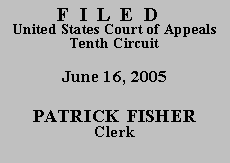

| MARK A. WOOLLEY,
v.
STATE OF KANSAS
|
|
Before KELLY, O'BRIEN, and TYMKOVICH,
Circuit Judges.
After examining the briefs and appellate record, this panel has determined
unanimously that oral argument would not materially assist the determination of
this appeal. See Fed. R. App. P. 34(a)(2); 10th Cir. R. 34.1(G). The case is
therefore ordered submitted without oral argument.
Mark Woolley, a patient at a Pennsylvania State Mental Hospital, filed a pro se appeal challenging the District Court's denial of his third motion to reconsider its judgment dismissing his civil rights complaint as legally frivolous. Exercising jurisdiction pursuant to 28 U.S.C. 1291, we affirm the district court's denial of Woolley's final motion for reconsideration and dismiss his appeal.(1)
Woolley collapsed in rural Kansas while hitchhiking from his home in Pennsylvania to Mexico. He was taken to a local hospital where he received treatment for blisters on his feet. While at the hospital, he was interviewed by a woman from Kansas Mental Health. As a result, he was taken to the county jail and remained there until a hearing the next day. Represented by counsel, Woolley was found to be a danger to himself or others and was placed in Larned State Hospital for fourteen days.
Woolley filed two pro se complaints pursuant to 48 U.S.C. 1983 and the Americans with Disabilities Act, claiming his removal from the hospital was a seizure and his detention at the mental health facility violated the First, Fourth, Eighth and Fourteenth Amendments of the United States Constitution. The district court granted Woolley's motion to proceed in forma pauperis, consolidated the complaints and liberally construed his claims.
After carefully recounting the procedures leading to Woolley's placement, the district court found the procedure in conformance with Kansas law. The court then stated:
A close review of the complaints suggests plaintiff does not challenge the procedures afforded to him but rather the motivation for the decision. It is this assertion which the court believes requires dismissal of this action. Plaintiff's claim that he was committed due to his religious beliefs is patently frivolous, and if his placement in custody is in fact related in any way to alcoholism and drug addiction, he fails to identify how the Americans with Disabilities Act might prohibit such placement.
(R., Doc. 3 at 4). Following the district court's dismissal of his complaints, Woolley filed his first motion for reconsideration on August 26, 2002, which was denied on November 8, 2002. On May 3, 2004, Woolley filed his second motion for reconsideration. That motion was denied on May 5, 2004. Again, on July 30, 2004, he filed a third motion for reconsideration which was denied on November 18, 2004. Shortly thereafter, Woolley filed this pro se appeal.
We review the district court's denial of a Rule 60(b) motion for abuse of discretion. Servants of the Paraclete v. Does, 204 F.3d 1005, 1009 (10th Cir. 2000). A decision to "grant relief as justice requires under Rule 60(b) . . . is 'extraordinary and may only be granted in exceptional circumstances.' "Id. (quoting Bud Brooks Trucking, Inc. v. Bill Hodges Trucking Co., 909 F.2d 1437, 1440 (10th Cir.1990)). An appeal from a denial of a motion to reconsider addresses only the district court's order denying the motion, and not the underlying decision itself. Id.
A motion to reconsider may be founded on "(1) an intervening change in the controlling law, (2) new evidence previously unavailable, and (3) the need to correct clear error or prevent manifest injustice." Id. at 1012. Here, the record on appeal contains no indication that the district court misunderstood the facts, Woolley's position, or the controlling law. Rather, it appears Woolley merely wishes to advance the same arguments raised in prior briefing. The district court did not abuse its discretion in denying Woolley's third motion for reconsideration. See id. Woolley's appeal is patently frivolous; it is DISMISSED. See 28 U.S.C. 1915 (e)(2)(B).(2)
Entered by the Court:
Terrence L. O'Brien
United States Circuit Judge
*. This order and judgment is not binding precedent except under the doctrines of law of the case, res judicata and collateral estoppel. The court generally disfavors the citation of orders and judgments; nevertheless, an order and judgment may be cited under the terms and conditions of 10th Cir. R. 36.3.
1. Woolley submitted a "Brief in Support of My Omnibus Pretrial Brief" which we construe as a motion to file a supplemental brief. We grant his implicit motion for the limited purpose of more clearly discerning the facts relevant to his case.
2. Under 28 U.S.C. 1915 (e)(2)(B) we are to dismiss the case at any time if we determine that the appeal is frivolous or fails to state a claim on which relief may be granted.